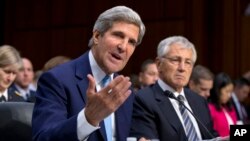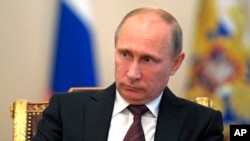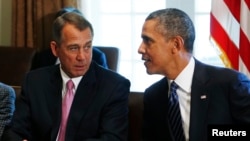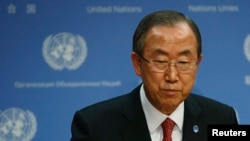A key Senate committee could vote as early as Wednesday on a measure authorizing U.S. military action in Syria
Leaders of the Foreign Relations Committee agreed late Tuesday on details of the plan that would give President Barack Obama authority to order limited strikes against Syrian military targets for 60 days. He could extend the window by another 30 days under certain conditions.
The resolution would not authorize the use of ground troops. It states military action must be aimed at deterring and preventing Syria from carrying out future chemical weapons attacks.
The measure would also require Obama to present a strategy for bringing a political resolution to the Syrian crisis.
The authorization must clear the committee and gain approval in the full Senate and House of Representatives before taking effect.
On Tuesday, Secretary of State John Kerry told the Foreign Relations Committee he has no doubt that U.S. inaction on Syria would lead to a greater war and more use of chemical weapons.
He said it is beyond any reasonable doubt that President Bashar al-Assad's government used chemical weapons on civilians in the attack last month that killed more than 1,400 people near Damascus. He said there is solid evidence the Syrian military carefully prepared for the attack.
Syria has denied using chemical weapons, alleging it was the rebels who deployed them.
Russia urges U.S. to show more evidence
Russian officials have said they are not convinced by evidence the United States has shared so far.
In an interview with the Associated Press and Russia's state Channel 1 television, Russian President Vladimir Putin said that the U.S. should present "convincing" evidence to the United Nations. He said he "doesn't exclude" supporting a U.N. authorization of force against Syria if there is such proof, but warned the U.S. against taking action without U.N. approval.
"Only the U.N. Security Council could sanction the use of force against a sovereign state," Putin said. "Any other pretext or method which might be used to justify the use of force against an independent sovereign state is inadmissible and can only be interpreted as an aggression."
Russia is hosting the upcoming G20 summit in St. Petersburg, where Syria is certain to top the agenda during sessions beginning on Thursday
Obama left Washington Tuesday evening. He is stopping in Stockholm for a one-day visit before flying on to Russia.
Key US lawmakers express support
In Washington, top lawmakers from both major U.S. political parties who met with President Obama Tuesday morning said they support his plan for a strike against Syria.
The Republican Party leader in the House of Representatives, Speaker John Boehner, has opposed Obama on many issues in the past, but said this is a different matter.
"We have enemies around the world that need to understand we are not going to tolerate this type of behavior," Boehner said, and he called on other members of his party to pledge their support.
Nancy Pelosi, who leads Obama's Democratic Party in the House, said Assad's tactics have taken Syria outside "the circle of civilized behavior," so the United States must respond.
Others in Congress remain leery of approving military force.
U.N. urges political solution in Syria
At the U.N, secretary-general Ban Ki-Moon said any use of chemical weapons in Syria is an “outrageous war crime,” and he called on the Security Council to “unite and develop an appropriate response” to bring the perpetrators to justice.
However, he said a political solution to the crisis in accordance with the U.N. Charter is the best way to proceed. He cautioned that any use of force to punish those responsible for the chemical attack would not be legal without U.N. authorization.
“This is a larger issue than the conflict in Syria," Ban said. "This is about our collective responsibility to humankind.”
The U.N. has experts working nonstop trying to determine whether chemical weapons were used on August 21 in neighborhoods near Damascus, but there is no word yet when their report will be complete.
If the United States launches missile attacks on Syria in retaliation for its suspected use of the nerve agent sarin against anti-government rebels, it will be just the latest in a long series of U.S. foreign military operations. What is unusual is that President Barack Obama is seeking congressional approval ahead of the attack.
US has long history of overseas military operations
VOA reporter Ken Bredemeier says previous U.S. presidents have gone to Congress for declarations of war after the country was directly attacked, such as by Japan at the start of World War II.
But more often, American presidents have acted on their own, using their authority as the constitutionally designated commander-in-chief. In such cases they have acted without advance approval to send troops abroad, engage in bombing attacks, or dispatch U.S. military personnel to work with international allies.
By some counts, the U.S. has been involved in more than 50 significant military actions in the last half-century - an average of more than one a year - ranging from significant fighting in Vietnam, Iraq and Afghanistan to lesser incursions in such far-flung countries as Kuwait, Bosnia, Pakistan, Libya, Grenada, Haiti and Panama.
Chris Hannas and Sam Verma contributed to this report from Washington
Leaders of the Foreign Relations Committee agreed late Tuesday on details of the plan that would give President Barack Obama authority to order limited strikes against Syrian military targets for 60 days. He could extend the window by another 30 days under certain conditions.
The resolution would not authorize the use of ground troops. It states military action must be aimed at deterring and preventing Syria from carrying out future chemical weapons attacks.
The measure would also require Obama to present a strategy for bringing a political resolution to the Syrian crisis.
The authorization must clear the committee and gain approval in the full Senate and House of Representatives before taking effect.
On Tuesday, Secretary of State John Kerry told the Foreign Relations Committee he has no doubt that U.S. inaction on Syria would lead to a greater war and more use of chemical weapons.
He said it is beyond any reasonable doubt that President Bashar al-Assad's government used chemical weapons on civilians in the attack last month that killed more than 1,400 people near Damascus. He said there is solid evidence the Syrian military carefully prepared for the attack.
Syria has denied using chemical weapons, alleging it was the rebels who deployed them.
Russia urges U.S. to show more evidence
Russian officials have said they are not convinced by evidence the United States has shared so far.
In an interview with the Associated Press and Russia's state Channel 1 television, Russian President Vladimir Putin said that the U.S. should present "convincing" evidence to the United Nations. He said he "doesn't exclude" supporting a U.N. authorization of force against Syria if there is such proof, but warned the U.S. against taking action without U.N. approval.
"Only the U.N. Security Council could sanction the use of force against a sovereign state," Putin said. "Any other pretext or method which might be used to justify the use of force against an independent sovereign state is inadmissible and can only be interpreted as an aggression."
Russia is hosting the upcoming G20 summit in St. Petersburg, where Syria is certain to top the agenda during sessions beginning on Thursday
Obama left Washington Tuesday evening. He is stopping in Stockholm for a one-day visit before flying on to Russia.
Key US lawmakers express support
In Washington, top lawmakers from both major U.S. political parties who met with President Obama Tuesday morning said they support his plan for a strike against Syria.
The Republican Party leader in the House of Representatives, Speaker John Boehner, has opposed Obama on many issues in the past, but said this is a different matter.
"We have enemies around the world that need to understand we are not going to tolerate this type of behavior," Boehner said, and he called on other members of his party to pledge their support.
Nancy Pelosi, who leads Obama's Democratic Party in the House, said Assad's tactics have taken Syria outside "the circle of civilized behavior," so the United States must respond.
Others in Congress remain leery of approving military force.
U.N. urges political solution in Syria
At the U.N, secretary-general Ban Ki-Moon said any use of chemical weapons in Syria is an “outrageous war crime,” and he called on the Security Council to “unite and develop an appropriate response” to bring the perpetrators to justice.
However, he said a political solution to the crisis in accordance with the U.N. Charter is the best way to proceed. He cautioned that any use of force to punish those responsible for the chemical attack would not be legal without U.N. authorization.
“This is a larger issue than the conflict in Syria," Ban said. "This is about our collective responsibility to humankind.”
The U.N. has experts working nonstop trying to determine whether chemical weapons were used on August 21 in neighborhoods near Damascus, but there is no word yet when their report will be complete.
If the United States launches missile attacks on Syria in retaliation for its suspected use of the nerve agent sarin against anti-government rebels, it will be just the latest in a long series of U.S. foreign military operations. What is unusual is that President Barack Obama is seeking congressional approval ahead of the attack.
US has long history of overseas military operations
VOA reporter Ken Bredemeier says previous U.S. presidents have gone to Congress for declarations of war after the country was directly attacked, such as by Japan at the start of World War II.
But more often, American presidents have acted on their own, using their authority as the constitutionally designated commander-in-chief. In such cases they have acted without advance approval to send troops abroad, engage in bombing attacks, or dispatch U.S. military personnel to work with international allies.
By some counts, the U.S. has been involved in more than 50 significant military actions in the last half-century - an average of more than one a year - ranging from significant fighting in Vietnam, Iraq and Afghanistan to lesser incursions in such far-flung countries as Kuwait, Bosnia, Pakistan, Libya, Grenada, Haiti and Panama.
Chris Hannas and Sam Verma contributed to this report from Washington








